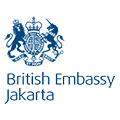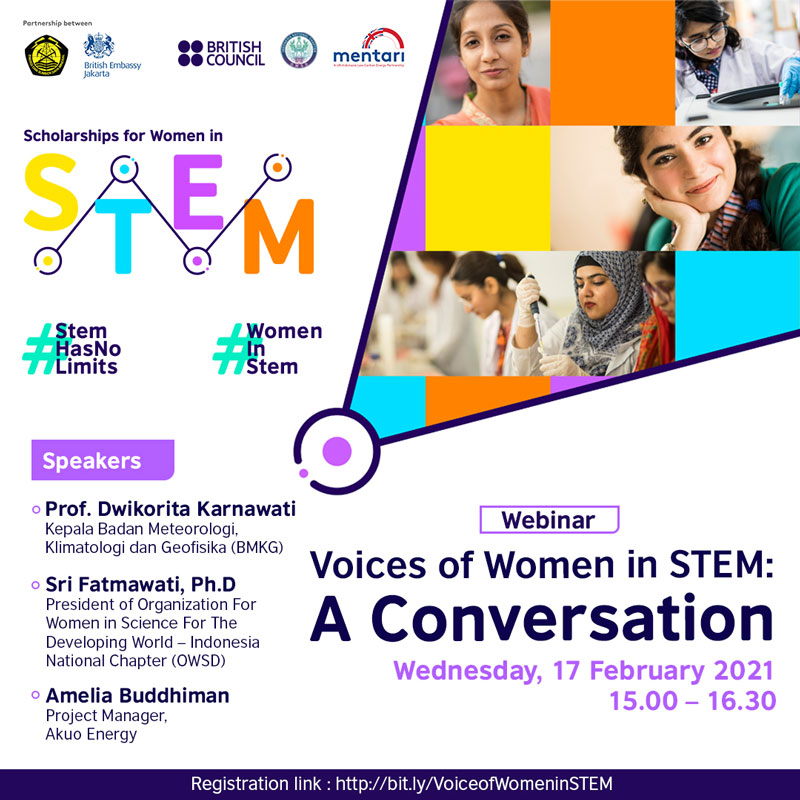Women Can Strongly Pursue And Have A Successful Career In The Field Of STEM
Jakarta, 17 February 2021 – The opportunity for women to pursue the field of stem (science, technology, engineering, and mathematics) is a very possible thing. Even they can have a career and success in the field, including the realm of “Green Jobs,” as in the field of renewable energy. This was revealed in the “Voices of Women in STEM: A Conversation”, which was held in conjunction with the celebration of the International Day of Women and Girls in Science, in Jakarta, (17/2).
This event was held by collaboration from the British Council, MENTARI Program and was supported by the British Embassy in Jakarta, and the Ministry of Energy and Mineral Resources. This activity displays several successful inspirational female speakers who are currently continuing to work in the field of STEM. In addition, this activity also discusses the opportunity in Green Jobs and Technical Education to the Women’s STEM Scholarship Programs.
The speakers who participated in this event, among others, are Femmy Soemantri from the Partnership and Advocacy Lead on Pulse Lab Jakarta; Professor Dwikorita Karnawati, Ph.D, Head of the Meteorology, Climatology and Geophysics Agency or (BMKG); Sri Fatmawati, S.Si, M.Sc, Ph.D., Chairperson of the Organization of Women in Science for Developing WORLD; Amelia Buddhiman as Project Manager in the Energy Aquo.
Hugh Moffat as the Country Director of the British Council Indonesia, said he was proud to show inspirational women in Indonesia in the field of STEM. According to Moffat, so far, the access to education is a special factor and the factor of the low representation of women in STEM. Not only in Indonesia, but also throughout the world and included in the UK. According to him, there are many more women to work in the field of STEM.
“To realize this, the British Council will open more opportunities. We focus on girls in school and focus on having to make girls stay in school. Focus on supporting women to engage in leadership and network in science in stem. So, this year we are happy to announce that we have a Women in STEM Scholarship that provides opportunities for 90 women worldwide, 15 of them from Asia. You can apply for this opportunity from three universities in England. We have Glasgow University, which offers courses in energy transitions and climate change, John Moores University in Liverpool who observes health and life sciences and Stirling University which focuses on agriculture,” he explained.
Meanwhile, Julio Retana, the Mentari Program Leader Team, explained the green jobs and map of women in Indonesia in the field of STEM. But before he explained further, he told me about how few women explored in the field of STEM. Even so, women who are involved in it are known as leading womenand known as the best graduates with the best value.
“To be honest, the first time I have experience with gender inclusion in stem, especially in the engineering field, is my first day of college about 20 years ago. I sat with 150 other students and at that time I realized that there were no women in my faculty, it felt like the university was dominated by men. The department I chose was very low percentage of female students, maybe around five percent. So, for five years studying there, I only discussed with seven women. As I recall, if they work in groups, they are known to be the most responsible, smartest and they have a better value, the best value, “he explained.
Fifteen years afterwards, Julio saw several of them had a successful career with a high position. Meanwhile, some others are not because they are due to the various considerations that occur in their lives. This made Julio feel enthusiastic and conveying how the Mentari program he leads also prioritizes gender and inclusive in every element of their work program.
Furthermore, Julio explained, although there are very interesting aspects of environmentally friendly work, but in terms of gender inclusion and women’s participation in the Mentari program, we still rarely find women working in the field of new and renewable energy. If anything, the majority of them occupy more administrative work positions.
“Some of the obstacles we find and ever discussed in a literature, especially in Indonesia, culture and social norms are a barrier to women to enter the world of work. Some of them, as we know, patriarchal culture is still inherent in Indonesia. Women are considered inappropriate to handle physical work. The main problem on the road when going to the work site is also often a barrier of women’s mobility, “he explained.
The things mentioned Julio also revealed in the story of the women’s speakers present. Moreover, when they must study in pregnancy. As experienced by Sri Fatmawati, who during a post-doctoral study in Japan, was pregnant. One of the professors told her to return to Indonesia. “The Professor has never met a female researcher who can work in the laboratory during pregnancy and after giving birth,” said Sri Fatmawati, an organic chemist of natural ingredients, which currently leads the OWSD Indonesia Chapter.
Even Amelia, when she first worked as an engineer, someone told her to make photocopies of documents and assume that it is common for a woman to work as an administrative staff in the field of work that is very dominated by men. Even when working in the field, it was not uncommon for her to be harassed by male workers. “Embarrassing, but I remain firm in doing my job,” she said.
In a challenging situation like that, women are asked not to give up. Instead, they must show their qualities and their abilities to the fullest. This is emphasized by Prof. Dwikorita Karnawati. “For young Indonesian women who are interested in pursuing a career in STEM, if there are doubts, please look for information as complete and as soon as possible. STEM has a very wide coverage, from field engineers off the coast to researchers in the laboratory, and all are equally as important. Importantly, we remain steadfast, resilient, and ask guidance from the Almighty, “Dwikorita said.
According to data from UNESCO, only around 30 per cent of the total researchers in the world are women. In addition, only 30 per cent of the whole female students in the world chose STEM-related departments at the higher education level. (Musfarayani/MENTARI)
===
Speakers Profile:
Femmy Soemantri, a woman who has been in the field of science is long enough and now she occupies the position of Partnership and Advocacy Lead on Pulse Lab Jakarta.
Professor Dwikorita Karnawati, Ph.D, is the head of the Meteorology, Climatology and Geophysics Agency (BMKG). He is also quite known as a legendary Chancellor at Gajah Mada University. Dwikorita is also an alumnus of Leeds University in the UK and Tokyo University, Japan. She is also known as one of the Key Figures of the Tsunami Early Warning System in Indonesia.
Sri Fatmawati, S.Si, M.Sc, Ph.D., is an assistant professor at the November 10 Institute of Technology and is also chairman of the organization of women in Science for Developing World (AODD) Indonesian National Chapter. She is an alumni of Kyushu University and conducted a lot of research in Japan and in France. Sri Fatmawati also received various awards, including the International Awards of The Elsevier Foundation, Kartini Awards, Inspiring Female Scientist, International L’Oreal-UNESCO for Women in Science Awards, and more.
Amelia Buddhiman is one of the figures in the STEM field and is a professional in STEM. Amelia works to be a professional in the field of STEM, specializing in the field of renewable energy. Now Amelia serves as Project Manager at Aquo Energy and leads various projects, including Project MC Indonesia GP, Project W3A and also Total ENP Solar Photovoltaic Project.







